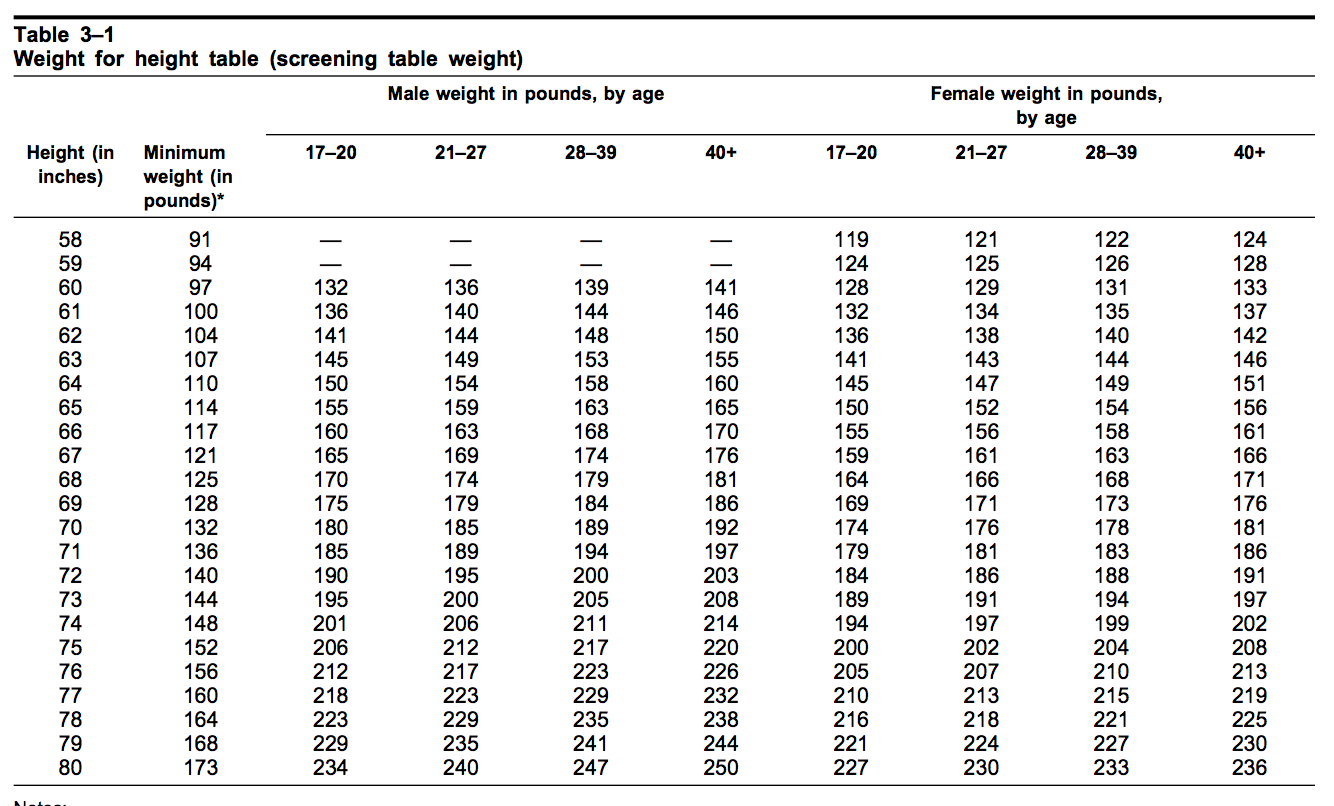The military is a rigorous environment that demands peak physical fitness from its members. One of the critical components of this fitness is the adherence to specific height and weight standards. These standards are not arbitrary; they serve to ensure that all soldiers are in optimal shape to perform their duties effectively. This article delves deep into the significance of army height and weight regulations, exploring how they impact recruitment, training, and overall military readiness.
Height and weight standards in the army are essential for maintaining a balanced and effective fighting force. They help to ensure that all soldiers can carry out their duties without undue strain on their bodies. Moreover, these standards assist in determining body composition, which is crucial for assessing a soldier's health and readiness for service. As we explore the various dimensions of army height and weight requirements, we will also look at how these regulations have evolved and what they mean for both current and prospective army personnel.
In this comprehensive guide, we will answer common questions related to army height and weight standards, provide insights into how these requirements are measured, and offer tips for those looking to meet or maintain these standards. Whether you are considering a military career or are simply curious about the fitness expectations of army personnel, this article aims to provide valuable information on army height and weight.
What Are the Army Height and Weight Standards?
The army height and weight standards are specific guidelines that dictate the acceptable ranges for a soldier's height and weight. These standards vary across different branches of the military and are designed to ensure that all personnel are physically fit to perform their duties. Generally, the army utilizes a body composition assessment that includes both height and weight measurements to determine if a soldier meets the required standards.
How Are Army Height and Weight Measurements Taken?
Measurements for army height and weight are taken during the enlistment process and at regular intervals throughout a soldier's service. The following steps are typically involved:
- Height is measured without shoes, with the individual standing straight against a wall or measuring device.
- Weight is recorded using a calibrated scale, and soldiers are required to wear minimal clothing for accuracy.
- Body fat percentage may also be assessed using various methods, such as skinfold measurements or bioelectrical impedance analysis.
Why Do Height and Weight Standards Matter in the Army?
The height and weight standards in the army are crucial for several reasons:
- They ensure that soldiers can perform their duties effectively without physical limitations.
- They help to promote overall health and wellness among military personnel.
- They contribute to the operational readiness of the army as a whole.
What Happens If a Soldier Does Not Meet the Height and Weight Standards?
If a soldier fails to meet the height and weight standards, there are specific repercussions they may face. These can include:
- Mandatory participation in a weight control program.
- Potential disciplinary action, including administrative separation.
- Impact on promotions and assignments.
Can Soldiers Appeal Height and Weight Measurements?
Yes, soldiers have the option to appeal their height and weight measurements if they believe there has been an error in the assessment process. The procedure typically involves:
- Submitting a written appeal to the appropriate chain of command.
- Requesting a retest or additional measurements to verify body composition.
Are There Different Height and Weight Standards for Men and Women?
Yes, the army has different height and weight standards for male and female soldiers. These differences account for physiological variations between sexes and ensure that both men and women are held to appropriate fitness expectations. The standards are designed to maintain fairness while still promoting a healthy and capable fighting force.
How Can Soldiers Maintain Army Height and Weight Standards?
Maintaining army height and weight standards requires dedication and effort. Here are some strategies that soldiers can adopt:
- Regular physical training that combines cardiovascular exercise, strength training, and flexibility workouts.
- Adopting a balanced and nutritious diet that supports overall health and fitness goals.
- Monitoring body composition regularly to stay informed about progress and make necessary adjustments.
What Resources Are Available to Help Soldiers Meet Height and Weight Standards?
The army provides various resources to help soldiers meet and maintain height and weight standards, including:
- Fitness training programs and classes.
- Nutritional counseling and guidance.
- Support groups and mentorship opportunities within the unit.
Conclusion: The Impact of Army Height and Weight Standards
In conclusion, army height and weight standards play a vital role in ensuring that soldiers are physically fit and capable of performing their duties. These standards not only promote individual health but also contribute to the overall readiness and effectiveness of the military. By understanding the importance of these regulations and adopting the necessary strategies to meet them, soldiers can ensure that they remain in peak condition throughout their service.
Unveiling The Life Of Jessica Kirson: A Glimpse Into Her Children
Exploring The World Of GayForFans: A New Era Of LGBTQ+ Content Creation
Luna Blaise: An Insight Into Her Relationships


